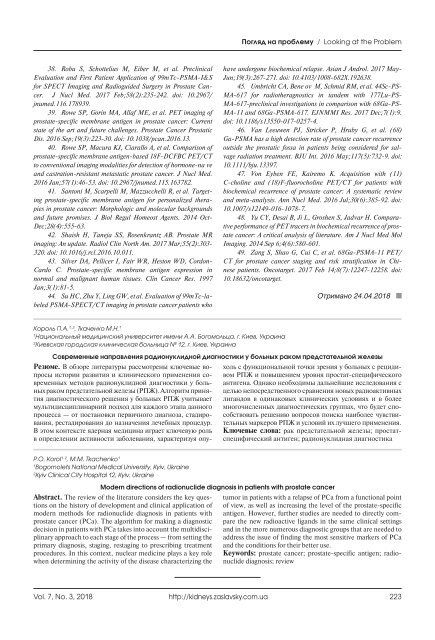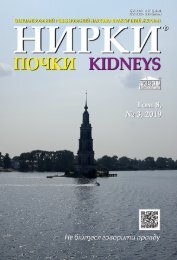Журнал "Почки" том 7, №3 (2018г.)
You also want an ePaper? Increase the reach of your titles
YUMPU automatically turns print PDFs into web optimized ePapers that Google loves.
Погляд на проблему / Looking at the Рroblem<br />
38. Robu S, Schottelius M, Eiber M, et al. Preclinical<br />
Evaluation and First Patient Application of 99mTc‐PSMA‐I&S<br />
for SPECT Imaging and Radioguided Surgery in Prostate Cancer.<br />
J Nucl Med. 2017 Feb;58(2):235-242. doi: 10.2967/<br />
jnumed.116.178939.<br />
39. Rowe SP, Gorin MA, Allaf ME, et al. PET imaging of<br />
prostate‐specific membrane antigen in prostate cancer: Current<br />
state of the art and future challenges. Prostate Cancer Prostatic<br />
Dis. 2016 Sep;19(3):223-30. doi: 10.1038/pcan.2016.13.<br />
40. Rowe SP, Macura KJ, Ciarallo A, et al. Comparison of<br />
prostate‐specific membrane antigen‐based 18F‐DCFBC PET/CT<br />
to conventional imaging modalities for detection of hormone‐naïve<br />
and castration‐resistant metastatic prostate cancer. J Nucl Med.<br />
2016 Jan;57(1):46-53. doi: 10.2967/jnumed.115.163782.<br />
41. Santoni M, Scarpelli M, Mazzucchelli R, et al. Targeting<br />
prostate‐specific membrane antigen for personalized therapies<br />
in prostate cancer: Morphologic and molecular backgrounds<br />
and future promises. J Biol Regul Homeost Agents. 2014 Oct-<br />
Dec;28(4):555-63.<br />
42. Shaish H, Taneja SS, Rosenkrantz AB. Prostate MR<br />
imaging: An update. Radiol Clin North Am. 2017 Mar;55(2):303-<br />
320. doi: 10.1016/j.rcl.2016.10.011.<br />
43. Silver DA, Pellicer I, Fair WR, Heston WD, Cordon-<br />
Cardo C. Prostate‐specific membrane antigen expression in<br />
normal and malignant human tissues. Clin Cancer Res. 1997<br />
Jan;3(1):81-5.<br />
44. Su HC, Zhu Y, Ling GW, et al. Evaluation of 99mTc‐labeled<br />
PSMA‐SPECT/CT imaging in prostate cancer patients who<br />
have undergone biochemical relapse. Asian J Androl. 2017 May-<br />
Jun;19(3):267-271. doi: 10.4103/1008-682X.192638.<br />
45. Umbricht CA, Benešová M, Schmid RM, et al. 44Sc‐PS-<br />
MA‐617 for radiotheragnostics in tandem with 177Lu‐PS-<br />
MA‐617‐preclinical investigations in comparison with 68Ga‐PS-<br />
MA‐11 and 68Ga‐PSMA‐617. EJNMMI Res. 2017 Dec;7(1):9.<br />
doi: 10.1186/s13550-017-0257-4.<br />
46. Van Leeuwen PJ, Stricker P, Hruby G, et al. (68)<br />
Ga‐PSMA has a high detection rate of prostate cancer recurrence<br />
outside the prostatic fossa in patients being considered for salvage<br />
radiation treatment. BJU Int. 2016 May;117(5):732-9. doi:<br />
10.1111/bju.13397.<br />
47. Von Eyben FE, Kairemo K. Acquisition with (11)<br />
C‐choline and (18)F‐fluorocholine PET/CT for patients with<br />
biochemical recurrence of prostate cancer: A systematic review<br />
and meta‐analysis. Ann Nucl Med. 2016 Jul;30(6):385-92. doi:<br />
10.1007/s12149-016-1078-7.<br />
48. Yu CY, Desai B, Ji L, Groshen S, Jadvar H. Comparative<br />
performance of PET tracers in biochemical recurrence of prostate<br />
cancer: A critical analysis of literature. Am J Nucl Med Mol<br />
Imaging. 2014 Sep 6;4(6):580-601.<br />
49. Zang S, Shao G, Cui C, et al. 68Ga‐PSMA‐11 PET/<br />
CT for prostate cancer staging and risk stratification in Chinese<br />
patients. Oncotarget. 2017 Feb 14;8(7):12247-12258. doi:<br />
10.18632/oncotarget.<br />
Отримано 24.04.2018<br />
Король П.А. 1, 2 , Ткаченко М.Н. 1<br />
1<br />
Национальный медицинский университет имени А.А. Богомольца, г. Киев, Украина<br />
2<br />
Киевская городская клиническая больница № 12, г. Киев, Украина<br />
Современные направления радионуклидной диагностики у больных раком предстательной железы<br />
Резюме. В обзоре литературы рассмотрены ключевые вопросы<br />
истории развития и клинического применения современных<br />
методов радионуклидной диагностики у больных<br />
раком предстательной железы (РПЖ). Алгоритм принятия<br />
диагностического решения у больных РПЖ учитывает<br />
мультидисциплинарний подход для каждого этапа данного<br />
процесса — от постановки первичного диагноза, стадирования,<br />
рестадирования до назначения лечебных процедур.<br />
В э<strong>том</strong> контексте ядерная медицина играет ключевую роль<br />
в определении активности заболевания, характеризуя опухоль<br />
с функциональной точки зрения у больных с рецидивом<br />
РПЖ и повышением уровня простат-специфического<br />
антигена. Однако необходимы дальнейшие исследования с<br />
целью непосредственного сравнения новых радиоактивных<br />
лигандов в одинаковых клинических условиях и в более<br />
многочисленных диагностических группах, что будет способствовать<br />
решению вопросов поиска наиболее чувствительных<br />
маркеров РПЖ и условий их лучшего применения.<br />
Ключевые слова: рак предстательной железы; простатспецифический<br />
антиген; радионуклидная диагностика<br />
P.O. Korol 1, 2 , M.M. Tkachenko 1<br />
1<br />
Bogomolets National Medical University, Kyiv, Ukraine<br />
2<br />
Kyiv Clinical City Hospital 12, Kyiv, Ukraine<br />
Modern directions of radionuclide diagnosis in patients with prostate cancer<br />
Abstract. The review of the literature considers the key questions<br />
on the history of development and clinical application of<br />
modern methods for radionuclide diagnosis in patients with<br />
prostate cancer (PCa). The algorithm for making a diagnostic<br />
decision in patients with PCa takes into account the multidisciplinary<br />
approach to each stage of the process — from setting the<br />
primary diagnosis, staging, restaging to prescribing treatment<br />
procedures. In this context, nuclear medicine plays a key role<br />
when determining the activity of the disease characterizing the<br />
tumor in patients with a relapse of PCa from a functional point<br />
of view, as well as increasing the level of the prostate-specific<br />
antigen. However, further studies are needed to directly compare<br />
the new radioactive ligands in the same clinical settings<br />
and in the more numerous diagnostic groups that are needed to<br />
address the issue of finding the most sensitive markers of PCa<br />
and the conditions for their better use.<br />
Keywords: prostate cancer; prostate-specific antigen; radionuclide<br />
diagnosis; review<br />
Vol. 7, No. 3, 2018<br />
http://kidneys.zaslavsky.com.ua 223















